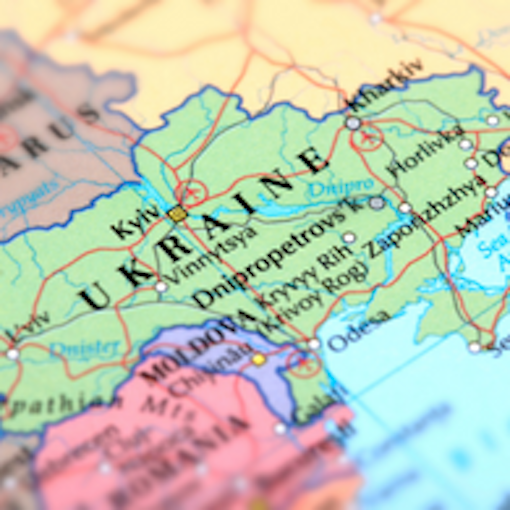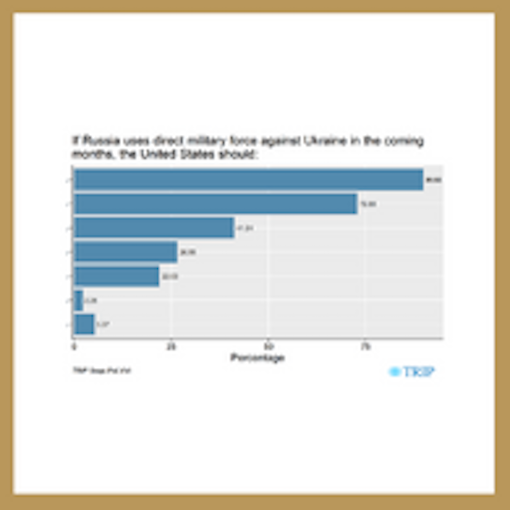Ukraine Special Issue: GRI Newsletter
Dear friends of GRI,The Russian invasion of Ukraine has caused thousands of deaths, millions of refugees, and billions in economic losses. The images coming out of Ukraine are simultaneously heart-wrenching, terrifying, and inspiring. As a scholar of international relations, I see the potential for major power war and a threat to the rules-based international order established after 1945. As scholars and students at GRI, we will not play a central role in this war, but we can do our part. I have been inspired by our community's response to this conflict and will continue to support efforts to help students, faculty, and alums make sense of the ongoing conflict and help mitigate its negative consequences.The links below highlight research and analysis from GRI experts that speak directly to the causes and consequences of the war in Ukraine. The production of knowledge within universities takes a great deal of time and effort. “Nimble” and “responsive” are not words that leap to mind when thinking about the research process. But scholars can bring knowledge, tools, and data to bear on pressing contemporary events, and GRI scholars have done so. Beyond the headlines documented below, GRI scholars have briefed U.S. officials on the likely Chinese government response to the sanctions regime; provided data and analysis to government agencies tracking Russian disinformation campaigns; organized open letters from scholars opposing the war; supported student groups here on campus; and worked to provide visiting positions to Ukrainian scholars displaced by the war. Some members of the GRI community have been more directly impacted by the war. Many of you will remember Dr. Ivan Gomza, who was a Visiting Fulbright Scholar at GRI in 2017. He taught a course on conflict processes, mentored W&M research students, and collaborated with the TRIP project as its Ukrainian country partner. Here is a short account of Ivan’s journey from Kyiv to Lviv during the first few days of the war. I hope all GRI students, scholars, and graduates know the value of sharing their experiences and educating others, especially during times of crisis. Another member of our community doing just this is Valerie Hopkins, an ABC Project alum who is currently risking her life in Ukraine to cover the war for The New York Times.My thoughts today are with Ivan, Valerie, and all the Ukrainians and Russians who are risking their lives to resist Vladimir Putin’s aggression against Ukraine.Best,Mike
Last week, W&M's Global Research Institute convened a panel of experts to discuss "Russia, Ukraine, and the Future Global Order." From hyper-polarization to disinformation narratives to the uncertain future of alliances, the causes and implications of Putin's invasion warrant scholarly debate. At the links below, watch the event recording and read new publications to learn how the Institute's researchers assess Putin's decision-making process, Ukraine's response, the role of the rest of the world, and more.

International Justice Lab
IJL Director Dr. Kelebogile Zvobgo and Fellows explore how the International Criminal Court’s investigation into alleged atrocity crimes in Ukraine might unfold, accounting for the history of an earlier probe, the role of Belarus, a key limitation in jurisdiction, and unprecedented mass referrals from nearly one third of the Court’s member states.

GRI Affiliate Steve Hanson
In classifying Putin's motives, GRI Affiliate Steve Hanson steers audiences away from using conventional labels — such as democratic or autocratic, and rational or crazy. Putin aligns with patrimonial rule — the resurgence of which Hanson and Jeffrey Kopstein examined in Perspectives on Politics last year, warning of dire consequences.

American Bosnian Collaboration Project
Lack of a resolute response to the invasion of Ukraine would embolden Putin to go further in attempting to forcibly redraw borders in Eastern Europe and the post-Soviet space, as well as encourage other authoritarian leaders seeking to forcibly redraw boarders in the Balkans and globally, Director of the ABC Project Paula Pickering advises in a Q&A.

GRI Affiliate Steve Hanson
Putin's invasion advances a broader anti-democratic trend, which has proven to be potent around the world, according to GRI Affiliate Steve Hanson. He calls this phenomenon "one of the most remarkable developments of the early 21st century."

GRI Affiliate Jessica Trisko Darden
GRI Affiliate Jessica Trisko Darden explores the history of US engagement in Ukraine, and analyzes what forms of support can help the country rebuild. She also identifies "significant unintended consequences" of a surge in military assistance and weapons.

Project on International Peace and Security
Though it's reasonable to expect the American public to make sacrifices in the short-term, PIPS Co-Director Amy Oakes cautions against what may happen if Americans fail to withstand the effect of sanctions. A new article for 13News Now summarizes GRI's panel discussion.

Teaching, Research & International Policy Project
Nearly 90 percent of IR scholars who responded to TRIP's snap poll advocate for the use of sanctions against Russia, and fewer than three percent say the US should take direct military action, the team shares in a Foreign Policy article.

GRI Affiliate Steve Hanson
Several weeks before Putin's invasion, GRI Affiliate Steve Hanson considered potential outcomes for NATO, whose role in US security has been downplayed in American foreign policy debates over the past two decades.

Project on International Peace and Security
Resentment toward the West's expanding influence in Eastern Europe likely played a more salient role in Putin's decision-making than the cost of a large military deployment, explains PIPS Co-Director Dennis Smith.














